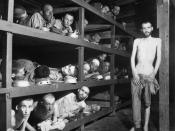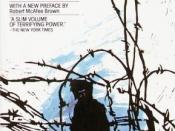"Evil is the quality of being morally bad or causing harm, misfortune, suffering, or destruction"ÃÂ (Encarta). "In literature, evil often triumphs but never conquers."ÃÂ The particular perspective of this statement can be applied to two works of literature that I have read. In the novel Night, by Elie Wiesel, evil is displayed by the Nazi's but never fully conquers because the Jewish people are set free. In the novel Animal Farm, by George Orwell, Molly displays evil when she tries to destroy the windmill and the farm. The animals were able to work together and re-build the windmill and tried not to let Molly's actions get in their way. Characters may experience various levels of evil in many different ways throughout a novel.
Elie Wiesel, the main character in the novel Night, is taken as a fourteen year old boy into a concentration camp, not knowing his whole life is about to change.
The Nazis, under the guidance of Adolf Hitler, dehumanized the Jewish people. No one will every fully understand how anyone could have done this but evil played the major role in the Holocaust, destroying so many innocent lives. Over six million Jews were killed during this horrible time. In the end, evil did not fully conquer. Many Jews were able to survive because of their strong will. Ellie Wiesel is a survivor of the Holocaust and never let evil conquer him but he conquered evil.
Evil is portrayed in many different ways throughout the course of a novel. In Animal Farm, by George Orwell, Molly, a mare, is out to destroy the farm. Molly craves the attention of human beings and ends up having a difficult time with her new life on Animal Farm. One night, shortly after Molly disappeared, she sneaks...


